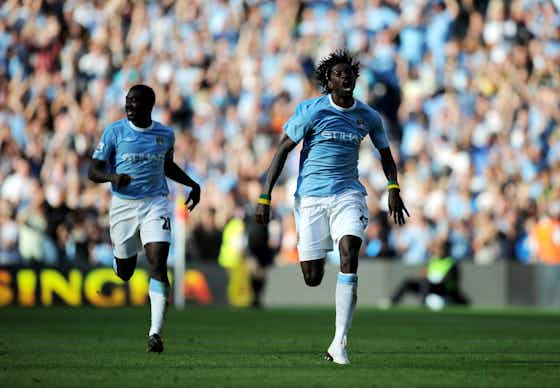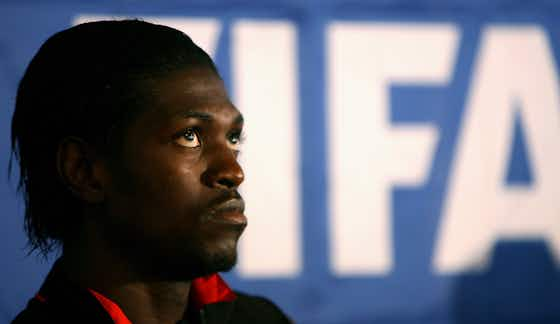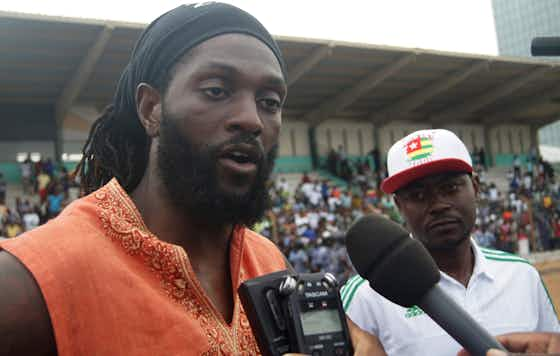El Arte Del Futbol
·8 August 2020
Looking back at the career & life of one Africa’s most divisive players – Emmanuel Adebayor

In partnership with
Yahoo sportsEl Arte Del Futbol
·8 August 2020

For many, Emmanuel Adebayor represents the epitome of a modern-day mercenary in the world of football. And maybe that is understandable, considering the Togolese 36-year old has represented 11 different clubs since the beginning of the 2000s, three of them alone within the borders of London. Always with an exceptionally high salary demand, and a recurring theme of never establishing himself as a fan favourite, Adebayor will not be remembered too fondly by supporters from a fair share of the clubs he represented. But behind the multi-millionaire striker, there is a story, one of grief, struggles, wealth and a special mentality, a rags-to-riches tale about a man with another side to him than the greedy superstar often portrayed in media. This is the story of Emmanuel Adebayor.
When Sheyi Emmanuel Adebayor was born in Lomé, the capital city of Togo, the future wasn’t looking bright for him. The year was 1984, and his family had next to no money, while quite literally struggling to survive. Emmanuel himself couldn’t even walk until the age of four when one day a ball rolled into the local church, at which point the young boy suddenly rose up and started chasing it. Regardless if we want to categorise the famous “miracle” as myth or fact, it symbolises the life of Adebayor perfectly. That the story took place in a church is indeed appropriate, since he to this day is a profoundly religious man, but of course what we emphasise, is the football coming in and changing his life, in more than one way. Because it would soon be evident that playing football was the only path for Emmanuel, in which he could bring a new, improved life for himself and his family.
To truly achieve this future, though, a move abroad would have to take place, something that took a lot of courage to go through with. Scouts from Ligue 1 club FC Metz provided this opportunity, which meant Adebayor had to leave his family behind at 15 years of age, and travel to a completely new and different continent, all while having the pressure of providing for everyone back home in Africa with what little money he was receiving in the youth team. This obviously took a toll on the young man, who later revealed he was close to committing suicide more than once because of the pressure he had on him from a family he has since described as manipulative and greedy. Emmanuel powered through though, and soon his talent became evident for the rest of Ligue 1, which led to a move to AS Monaco. Here the 6 ft 3 striker produced a couple of decent seasons and got his first taste of Champions League football, which also opened the eyes of Arsenal, who identified his potential and brought him to the Premier League.
It was at Arsenal he took the steps towards international stardom, thanks to four impressive seasons where he amassed 62 goals & 22 assists in 142 games. He had established himself as one of the top strikers in the league, and especially in the 07/08 season, he was seemingly unstoppable, scoring 30 goals in all competitions and gaining worldwide attention as Arsenal surged up the table and secured a top 3 position (finishing just 5 points from table-toppers Manchester United). The following season, however, Wenger and Adebayor’s relationship started to deteriorate. In recent years Emmanuel has revealed that Wenger gave him an ultimatum: stay as a bench player or leave. He made a swift decision and left the club. Meanwhile, on the other side of England, a revolution had begun in the blue half of Manchester. Amid major investment, Manchester City’s new owners had visualised the project that would turn a mid-table team into title challengers, and for that to become a reality, a squad consisting of some of Premier League’s best players was assembled. In the summer of 2009, City spent a whopping €147m, with Emmanuel Adebayor and Carlos Tevez being the clear marquee signings, both arriving for €29m each. While it’s highly possible that being a part of the exciting project that was being built appealed to Adebayor, there is no denying that money was a huge motivation. As one of the first big players to cash in on Man City’s riches, he earned an incredible 150k a week, making him one of the top earners of the league at the time.

His time at City can be summarised into two moments, THAT taunting celebration against his former club, and the 6-month stay at Real Madrid. While Emmanuel did score a respectable 14 goals in his debut season, nothing he did at City left as big of an imprint as the “incident” vs Arsenal just two months after switching teams. After receiving racial abuse aimed at him and his family throughout the game, Adebayor saw his chance for revenge with ten minutes left of the game. A cross came in towards him, he scored with a bullet header and put City in front with a 3-1 lead. The following moments went down in Premier League history, as he ran the length of the pitch to the away stand, celebrating his goal right in front of hundreds of furious Arsenal fans. On this day, Emmanuel Adebayor was probably the most hated man in England.
The second season was a struggle, as game time in Manchester was limited amidst the arrivals of Mario Balotelli and Edin Dzeko. In January of 2011, a perfect solution came forth, as Real Madrid needed a short-term replacement for the injured Gonzalo Higuain. Despite only playing 22 games for Madrid, he has named it the best period of his career. He scored eight goals and lifted what would turn out to be the only club trophy he’d ever win, the Spanish Cup. He wished to stay, but it wasn’t to be, something he partly blamed his family for, after they supposedly sent an official letter from the “Adebayor family” to the Spanish giants, advising against signing him permanently. This is yet another symbol of the constant ongoing battle Emmanuel faced against his own family during the length of his career.
In the summer of 2011, it was clear that Adebayor had no future at City. There were however plenty of suitors with heavy interest in him, Marseille being one of them, which in hindsight might have been the best option for his career. Ultimately though, he wanted a return to the Premier League, and Tottenham were willing to sign him on a loan deal. His astronomical wages were still an issue, but in his first season, he definitely proved to be an arrival capable of helping the club. With an impressive tally of 18 goals and 12 assists, there was once again an increasing belief in the Togolese centre-forward’s abilities. Spurs tied him down permanently for a couple of years, but unfortunately, he never topped those numbers of the first season.

By the end of the third season, Spurs fans loudly voiced their concerns with the seemingly arrogant and greedy aura of Adebayor, who was more than willing to stay on the bench for a top salary. When the performance level started to go down, the club couldn’t warrant keeping a misfiring player who was draining their wage budget, and once again, Emmanuel was asked to move on. This time, yet another London club took a gamble on the then 31-year old, but Adebayor’s time at Crystal Palace was probably the least memorable in his career, and he has since admitted that joining the club was the biggest mistake of his career.
While English football long ago had grown tired of Adebayor, there were still clubs around Europe, America and Asia that were attracted to his globally recognisable name and undeniable talent. In Turkey, Istanbul Basaksehir saw the opportunity to land a big name in Adebayor, and himself now once again being a free agent, jumped at the chance of being the star man in a physically and technically less demanding environment than the Premier League. Adebayor had two decent seasons at Istanbul, scoring seven respectively seventeen goals, and even getting a taste of Champions League and Europa League football once again. Those two seasons were probably the last quality periods we will ever see of Adebayor, sadly enough. After a failed third season, he had a short stint at Kayserispor, as well as an even shorter adventure for Paraguay first-tier side Olimpia Asuncion, which ended upon the outbreak of Covid-19. None of those ventures were anything special to write home about, and right now, at the age of 36, Adebayor is a free agent, more likely to retire from the sport in a near future than finding a new club.
In Europe, the main area of debate around Adebayor would probably be whether he should rank as one of the iconic strikers of the 21st century or a flop with unfulfilled potential. The truth probably lies somewhere in between those two statements. He never managed to establish himself as a key player in one club for more than a season at most and didn’t win any major trophies. On the other hand, he has played for some of the biggest teams in the world in Real Madrid, Arsenal, Man City, Monaco and Spurs. A “flop” simply doesn’t amass 205 goals & 67 assists on an elite level during the length of his career, in some of the toughest leagues in the world.
In Togo, however, the debate would look very different. Here the question would be less focused on his footballing ability (because let’s face it, he’s by far the greatest player Togo will see in a long, long time), but more focused on his life off the pitch. For context, one must go back to the early years of his National Team career. From the early 2000s, Adebayor had a difficult relationship with the Togolese Football Federation. First off, the constant struggle with the nation’s football association regarding salaries, bonuses and the economic structure, is a good representation of the country on its whole. Corruption and inequality are common elements in both Togo football and the state it represents. This was something Adebayor at an early stage was vocal about, and while his team-mates would praise him for this, the manager and governing body quickly pointed him out as a threat. In preparation for the 2006 World Cup (the first in Togo’s history), the tensions between administration officials, the NT coach and Adebayor culminated with the star man (who of course was appointed team captain) threatening to become the first nation ever to withdraw from a World Cup. Ultimately, they were convinced by FIFA officials to stay, but it was symptomatic of how poorly Togo was functioning.

The following year he was kicked out of the national team because of another row related to 60k worth of unpaid bonuses for all Togo players. At the time he was earning 65k a week, so unlike what media made it out to be, this was most probably not a ploy to get himself more money, but rather an attempt to seek fair compensation for the relatively poorly paid team-mates (most of them playing in the domestic league, where wages were extremely low compared to the European standard). Adebayor himself paid for travels, surgeries and meals for many fellow players, so in the dressing room he was adored, but the only image that came forth to the public, was that of a greedy superstar trying to take advantage of a poor nation when the case, in fact, was the opposite in many ways. Unfortunately, all these struggles left him with an even more tainted image, especially to the people of Togo, who received the news in a manner that suited the corrupt federation.
Adebayor’s Togo national team career has many notable key events which have had huge impacts on his life. The vicious machine-gun attack on January 8th 2010 must take the prize though, as it left him and the entire Togolese squad traumatised for life. Two days before the African Cup of Nations, the national team was travelling through a hotly contested province in Algeria, when suddenly gunshots appeared from the forest where the team bus was passing through. In the space of 30 minutes of constant firing, three passengers were killed, and another nine injured. Watching his wounded team members bleeding out and fighting for their lives, while constantly fearing for his own survival, must have been a kind of terror that never leaves you, and for Adebayor, it meant the end of his national team career, as he retired shortly after the attack, only 26 years old. The captain returned to the national team a year later, but this incident understandably never truly left him.
Even in recent times, Adebayor has managed to stay relevant, but perhaps as expected, for all the wrong reasons. Shortly upon returning to his home in Lomé, from Paraguay (where he was plying his trade for Olimpia), the first cases of Covid-19 were detected in Togo. This led to people pointing him out as the cause of spread, and as always, Adebayor became a target for huge amounts of criticism. While he most probably wasn’t the source for the spread, it didn’t help his cause that he went out publicly on social media making it clear he wouldn’t donate anything towards the efforts against the Coronavirus, despite being one of Togo’s richest men.
Ultimately though, Adebayor pretty much put Togo on the map for a large number of foreigners, who without his success most likely wouldn’t even have known of the nation’s existence. He also paved the way for future generations of Togo talent in the football industry, and despite what the media likes to paint of Adebayor, he has supported several foundations and charity-related projects in his homeland, mainly focused on the wellbeing of the unprivileged youth in Togo.

He is a man with many sides, often with the feeling of being misunderstood, a result of both his own actions and the image the media applied to him. Some of his achievements are just too great to ignore though because let’s be honest, only someone with the mentality of Sheyi Emmanuel Adebayor can take himself from one of the most poverty-stricken areas in the world to becoming a global superstar with financial freedom like few others with his upbringing. As Togo’s all-time top scorer, a winner of African POTY, and having represented and scored for some of the biggest clubs in the world, Adebayor has left his mark on the beautiful game, but it is up to the beholder to recognise how negative or positive the mark that he left was.
El Arte Del Futbol is an official content creator for OneFootball. Find more Original Features, Opinion Columns Player Profiles, Manager Profiles, Retro articles and Tactical Analysis’ on www.elartedf.com. If you are reading this on our website, we’d like to thank you for your continuous support! Follow us on twitter to stay updated with all the latest content.


Live




Live




Live




Live




















































